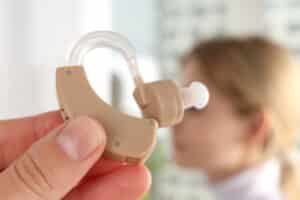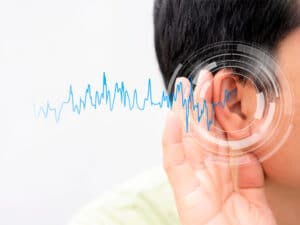Hearing aids have become indispensable devices for millions of individuals around the world, helping them navigate their daily lives with improved communication and enhanced quality of life. However, the effectiveness of these tiny marvels heavily relies on the proper care and maintenance of their power source – the hearing aid batteries. In this guide, we will delve into the dos and don’ts of caring for your hearing aid batteries to ensure optimal performance and longevity.
When you’re prescribed hearing aids, your audiologist in Westchester, NY, will give you guidance on how to clean and maintain them. As well as taking care of your hearing aids as a whole, you’ll need to give some thought to their batteries too.
Although there is a wide array of hearing aids on the market, the majority still run on zinc-air button disposable batteries. While you should always follow your audiologist’s instructions, there are some commons dos and don’t when it comes to carrying for zinc-air button disposable hearing aid batteries:
DO
1. Choose the right size:
This may sound obvious, but using the right size battery in your hearing aids is vital. If you’re unsure, ask for assistance so that you get the size you need. Trying to use an alternative size could be dangerous and may cause irreparable damage to your hearing aids. Fortunately, most hearing aid batteries are color-coded, so you should find it relatively easy to locate the appropriate size and shape.
2. Store them at room temperature:
Hearing aid batteries usually last for around three years at room temperature, so you can have a small stock at home without worrying about them expiring. Keeping spare hearing aid batteries means you’ll always have something to use if your existing batteries run out or are lost.
3. Remove the activation sticker:
Zinc-air button batteries are activated when they come into contact with air. To extend their lifespan, manufacturers place a clear sticker over part of the battery. Before use, this should be removed so that the air activates the battery and it begins to work. Many patients forget to remove this sticker and assume the battery is faulty or that their hearing aid has malfunctioned. If you’re experiencing issues are changing a battery, always check to make sure the activation sticker has been removed from the battery.
4. Leave battery compartments open overnight:
Depending on battery size and your usage, you can expect your batteries to last anywhere from three to 20 days. However, turning your hearing aids off when they’re not in use and leaving the battery compartment open overnight can help you to maximize the lifespan of your hearing aid batteries. In addition to this, leaving the battery compartment open overnight will ensure any moisture evaporates and reduces the risk of damage occurring.
5. Store them carefully:
As hearing aid batteries are so small, they can easily be picked up by young children and pets. If swallowed, zinc-air batteries can be extremely harmful, so it’s vital you seek urgent medical assistance if you suspect anyone or any animal has swallowed a hearing aid battery. To try and reduce the risk of hearing aid batteries falling into the wrong hands, identify a secure storage location which children and pets are unable to access.
DON’T
1. Put up with a reduced battery life:
Although the life of a hearing aid battery depends on your usage, size 10 batteries usually last between three to seven days, while size 312 can last from three to 10 days. For patients who use size 13 or size 675 batteries, you can expect them to last from six to 14 days or nine to 20 days, respectively. If your hearing aid batteries aren’t lasting as long as they should, it may be a sign that your hearing aid isn’t working properly. Visit your audiologist to test your device and rectify any faults.
2. Mix batteries of different sizes:
Never mix different sizes of hearing aid batteries. Each hearing aid model is designed to accommodate a specific battery size, and using the wrong size can lead to malfunction or damage.
3. Forget to turn off your hearing aids:
When not in use, remember to turn off your hearing aids. Leaving them on unnecessarily drains the battery, reducing its lifespan and requiring more frequent replacements.
4. Store them in humid areas:
Batteries should be stored at room temperature; keeping them humid can affect their performance. Kitchens and bathrooms can be particularly humid and have a relatively high moisture content, so avoid keeping them in these rooms if you can. Similarly, don’t store hearing aid batteries in an environment which is too cold. Some people believe that putting hearing aid batteries in the refrigerator will make them last longer, but there’s no evidence that this is true, and the refrigerator may cause them to deplete faster because of condensation, causing the tab to become loose.
5. Put them in the garbage:
When your hearing aid batteries have run out, don’t simply discard them or put them in the trash. Batteries need to be disposed of carefully, and in accordance with specific regulations, so you’ll need to find out what your state guidelines are. Many audiologists provide a drop-off facility which enables you to dispose of hearing aid batteries safely, so it’s best to make use of these services when you can.
FAQ’S
1. Should you keep hearing aid batteries in the refrigerator?
It’s generally not recommended to store hearing aid batteries in the refrigerator. While some believe this extends their lifespan, it can actually cause condensation, leading to faster depletion and potential damage to the batteries.
2. Storing hearing aid batteries – What’s the best approach?
The ideal storage for hearing aid batteries is at room temperature in a dry environment. Avoid humid areas like kitchens and bathrooms, as moisture can affect battery performance. Store them in a secure location away from children and pets.
3. How to store hearing aid batteries to maximize their lifespan?
To maximize the lifespan of hearing aid batteries, store them in a cool, dry place at room temperature. Keep them away from extreme temperatures and moisture. Additionally, ensure that the activation stickers are removed before storage.
4. What is the typical lifespan of hearing aid batteries?
The lifespan of hearing aid batteries varies depending on factors like size and usage. Generally, smaller batteries (like size 10) last between 3 to 7 days, while larger ones (like size 675) can last up to 20 days. However, individual usage patterns may affect these estimates.
5. How should I dispose of used hearing aid batteries?
Used hearing aid batteries should not be thrown in the garbage. They need to be disposed of properly in accordance with local regulations. Many audiologists offer drop-off facilities for safe battery disposal, so it’s best to utilize these services to protect the environment and prevent harm.
Conclusion:
Proper care of hearing aid batteries is essential for maintaining the functionality and longevity of your hearing aids. By following these dos and don’ts, you can ensure that your hearing aid batteries perform optimally, allowing you to enjoy the benefits of improved hearing for years to come. Remember, a little care goes a long way in preserving the effectiveness of these life-changing devices.
To find out more about caring for your hearing aid batteries, get in touch with Listen Hear Diagnostics at 914-902-8845 now. As the best audiologist in Westchester, Scarsdale, Greenwich, CT, NYC, and White Plains, we can provide expert guidance on maintaining your hearing aids and ensuring they continue to enhance your quality of life.








